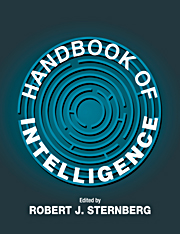Book contents
- Frontmatter
- Contents
- Preface
- Contributors
- PART I THE NATURE OF INTELLIGENCE AND ITS MEASUREMENT
- PART II DEVELOPMENT OF INTELLIGENCE
- PART III GROUP ANALYSES OF INTELLIGENCE
- PART IV BIOLOGY OF INTELLIGENCE
- PART V INTELLIGENCE AND INFORMATION PROCESSING
- PART VI KINDS OF INTELLIGENCE
- PART VII TESTING AND TEACHING INTELLIGENCE
- PART VIII INTELLIGENCE, SOCIETY, AND CULTURE
- PART IX INTELLIGENCE IN RELATION TO ALLIED CONSTRUCTS
- 26 Intelligence and Personality
- 27 Intelligence and Creativity
- 28 Intelligence and Wisdom
- Author Index
- Subject Index
26 - Intelligence and Personality
Published online by Cambridge University Press: 05 June 2012
- Frontmatter
- Contents
- Preface
- Contributors
- PART I THE NATURE OF INTELLIGENCE AND ITS MEASUREMENT
- PART II DEVELOPMENT OF INTELLIGENCE
- PART III GROUP ANALYSES OF INTELLIGENCE
- PART IV BIOLOGY OF INTELLIGENCE
- PART V INTELLIGENCE AND INFORMATION PROCESSING
- PART VI KINDS OF INTELLIGENCE
- PART VII TESTING AND TEACHING INTELLIGENCE
- PART VIII INTELLIGENCE, SOCIETY, AND CULTURE
- PART IX INTELLIGENCE IN RELATION TO ALLIED CONSTRUCTS
- 26 Intelligence and Personality
- 27 Intelligence and Creativity
- 28 Intelligence and Wisdom
- Author Index
- Subject Index
Summary
OVERVIEW
For more than half a century now psychologists have been exploring the avenues linking human intelligence to a wide array of personality traits in the hope of unravelling the mutual impact of intelligence and personality in the course of development and day-to-day behavior. Although these constructs are frequently kept apart, the artificiality of the distinction has been recognized by many of the key figures of differential psychology, including Binet, Terman, Thorndike, and Thurstone. Most notably, David Wechsler (1950) viewed intelligence as a manifestation of personality as a whole and argued that certain affective and motivational factors (interest, volition, etc.) are integral components of the construct of intelligence. According to Wechsler, because conative and affective factors function in concert with intelligence in determining intellectual performance, what is needed are not tests from which personality factors have been eliminated but tests in which these nonintellective factors are clearly present and objectively appraisable. Today, it is commonly agreed that some of the most interesting work in individual differences is being done at the interface of personality and intelligence (Snow, 1995). Because intelligence is often construed as the cognitive part of the construct of personality, the two constructs are in effect mutually intertwined (Brody, 1972).
This chapter sets out to survey some of the past and present attempts at shedding light on the nexus of relationships between intelligence and personality, two grand constructs of modern psychology. We begin by comparing two approaches to understanding the personality–intelligence interface.
- Type
- Chapter
- Information
- Handbook of Intelligence , pp. 581 - 610Publisher: Cambridge University PressPrint publication year: 2000
- 83
- Cited by

